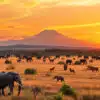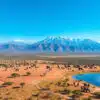Understanding Tanzania’s Travel Requirements
Before setting off to the land of Mount Kilimanjaro and the Serengeti, ensure you understand all the necessary documentation and health requirements for Tanzania. Travelers must have a valid passport, and most will require a visa—these can often be purchased upon arrival or in advance through the Tanzanian consulate or an electronic visa application. Familiarize yourself with the vaccinations recommended by the Centers for Disease Control and Prevention (CDC), which typically include Yellow Fever, Typhoid, Hepatitis A, and Malaria prophylaxis.
Determining the Best Time to Visit
Tanzania’s weather patterns largely influence the prime times for wildlife viewing. The country has two main seasons: dry (from late June to October) and wet (from November to May). The dry season is optimal for witnessing the Great Migration in the Serengeti and enjoying wildlife spotting near waterholes. Conversely, photographers may prefer the wet season for the lush landscapes and bird watching opportunities. Consider what experiences you wish to prioritize when planning your trip.
Choosing Your Safari Destination Wisely
Tanzania is home to some of the world’s most famous parks and reserves, such as Serengeti National Park, Ngorongoro Conservation Area, Selous Game Reserve, and Tarangire National Park. Each park offers unique landscapes and wildlife experiences. For example, Ngorongoro is renowned for its volcanic crater and dense concentration of wildlife, while the endless plains of the Serengeti are celebrated for the annual migration of wildebeest and zebra. Research and select the parks that align with your interests and the type of safari experience you want.
Embracing Cultural Etiquette
Tanzania is a country with a rich tapestry of cultures and traditions. When visiting, it’s essential to respect local customs and practices. Learn some basic Swahili phrases, dress conservatively, particularly when visiting villages or religious sites, and always ask permission before taking someone’s photograph. Embracing the local etiquette will enhance your travel experience and help build meaningful interactions with the Tanzanian people.
Staying Safe and Healthy
Traveler safety in Tanzania is mainly about preparation and common sense. Stick to well-traveled tourist areas, especially in cities, and be cautious when traveling at night. Always drink bottled or treated water and be cautious with street food to avoid traveler’s diarrhea. When on safari, listen to your guides—they are trained not only to show you the best wildlife but also to keep you safe. It’s essential to follow their instructions, especially in respecting wildlife and maintaining safe distances.
Contribution to Conservation Efforts
Ecotourism plays a significant role in Tanzania’s economy, but it also has the power to contribute positively to conservation efforts. Support responsible tour operators that promote ethical wildlife interactions and contribute to community development and habitat preservation. Remember, your choices as a traveler can contribute to the protection of Tanzania’s natural heritage for future generations.
Packing Essentials for Tanzania Safaris
Prepare for your safari by packing strategically. Essential items include lightweight, breathable clothing that can be layered (temperatures drop significantly at night), comfortable sturdy footwear, a broad-brimmed hat, and a high-SPF sunscreen. Binoculars are a must for wildlife observation, and getting a good pair can greatly enhance your experience. Lastly, pack a high-quality camera with zoom lenses to capture Tanzania’s majestic landscapes and wildlife while keeping a respectful distance.
Navigating Local Transportation
Getting around in Tanzania requires patience and flexibility. Domestic flights connect major cities and some tourist destinations, while buses and dalla-dallas (minibuses) offer land connections. For comfort and safety, it may be worth considering private transportation or guided tours, particularly for remote wildlife reserves and national parks. Car rentals are available, but it’s important to be comfortable with rough, unpaved roads and sometimes challenging driving conditions.
By meticulously preparing for your Tanzanian adventure and embracing the country’s diverse culture and natural wonders, you can ensure a safe, fulfilling, and unforgettable travel experience.



